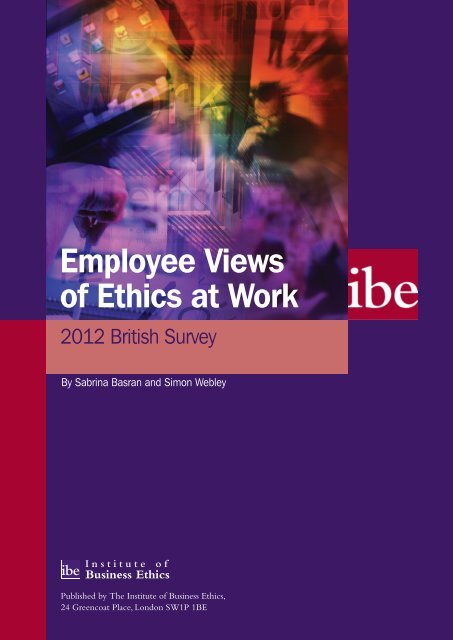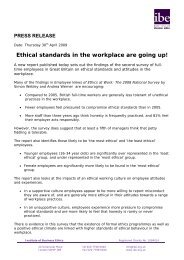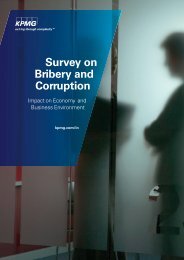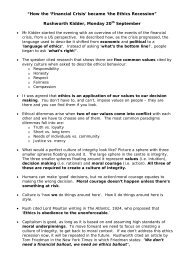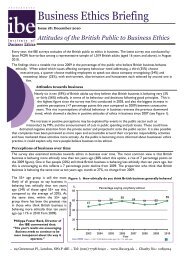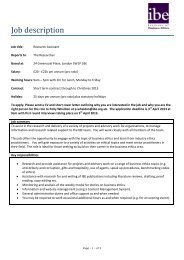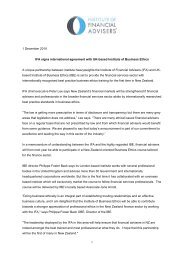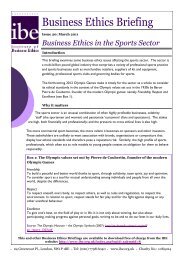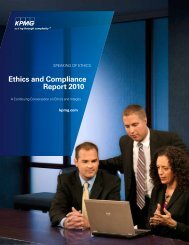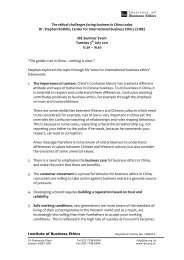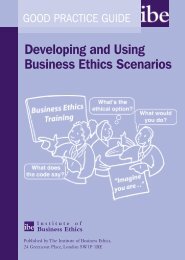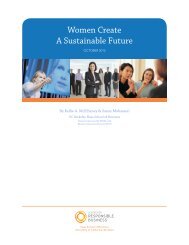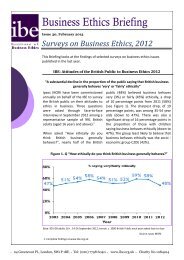Executive Summary - Institute of Business Ethics
Executive Summary - Institute of Business Ethics
Executive Summary - Institute of Business Ethics
Create successful ePaper yourself
Turn your PDF publications into a flip-book with our unique Google optimized e-Paper software.
Employee Views<br />
<strong>of</strong> <strong>Ethics</strong> at Work<br />
2012 British Survey<br />
By Sabrina Basran and Simon Webley<br />
Published by The <strong>Institute</strong> <strong>of</strong> <strong>Business</strong> <strong>Ethics</strong>,<br />
24 Greencoat Place, London SW1P 1BE
EMPLOYEE VIEWS OF ETHICS AT WORK<br />
The <strong>Institute</strong> <strong>of</strong> <strong>Business</strong> <strong>Ethics</strong> (IBE)<br />
<strong>Business</strong> <strong>Ethics</strong><br />
The IBE was established in 1986 by business people to encourage high<br />
standards <strong>of</strong> business behaviour based on ethical values.<br />
Today it leads the dissemination <strong>of</strong> knowledge and good practice in business<br />
ethics globally.<br />
We raise public awareness <strong>of</strong> the importance <strong>of</strong> doing business ethically, and<br />
collaborate with other UK and international organisations with interests and<br />
expertise in business ethics.<br />
We help organisations to strengthen their ethics culture to encourage high<br />
standards <strong>of</strong> business behaviour based on ethical values. We assist in the<br />
development, implementation and embedding <strong>of</strong> effective and relevant ethics and<br />
corporate responsibility policies and programmes. We help organisations to<br />
provide guidance to staff and build relationships <strong>of</strong> trust with their principal<br />
stakeholders.<br />
We facilitate the sharing <strong>of</strong> good practice in business ethics.<br />
We achieve this by:<br />
• Offering practical and confidential advice on ethical issues, policy,<br />
implementation, support systems and codes <strong>of</strong> ethics<br />
• Delivering training in business ethics for board members, and employees<br />
• Undertaking research and surveys into good practice and ethical<br />
business conduct<br />
• Publishing practical reports to help identify solutions to business dilemmas<br />
• Providing a neutral forum for debating current issues and meetings to facilitate<br />
the sharing <strong>of</strong> good practice<br />
• Supporting business education in the delivery <strong>of</strong> business ethics in the<br />
curriculum<br />
• Offering the media and others informed opinion on current issues and good<br />
practice.<br />
Our team apply their practical business experience <strong>of</strong> the issues that<br />
organisations face to fulfil the <strong>Institute</strong>'s vision and mission.<br />
The IBE is a registered charity, supported by donations from businesses and other<br />
organisations, as well as individuals.<br />
Through their donations, IBE subscribers help to promote ethical business<br />
practice. They also contribute to the work <strong>of</strong> the IBE by sharing good practice and<br />
experiences <strong>of</strong> ethical issues.<br />
<strong>Institute</strong> <strong>of</strong> <strong>Business</strong> <strong>Ethics</strong><br />
24 Greencoat Place, London SW1P 1BE<br />
Telephone: 020 7798 6040<br />
Fax: 020 7798 6044<br />
Website: www.ibe.org.uk<br />
E-mail: info@ibe.org.uk<br />
Registered Charity No. 1084014
EMPLOYEE VIEWS OF ETHICS AT WORK<br />
Contents<br />
Page<br />
<strong>Executive</strong> <strong>Summary</strong> 5<br />
Introduction 7<br />
Chapter 1. Employee Attitudes to Ethical 11<br />
Standards and Practice at Work<br />
Chapter 2. Employee Perceptions <strong>of</strong> Behaviour 18<br />
and Culture in Organisations<br />
Chapter 3. Assistance for Employees on 33<br />
Ethical Matters<br />
Conclusions 42<br />
Appendix 1: The IBE British <strong>Ethics</strong> at Work Questionnaire 44<br />
Appendix 2: A Note on Statistical Method 51<br />
Recent IBE Publications 52<br />
3
EMPLOYEE VIEWS OF ETHICS AT WORK<br />
Authors<br />
Sabrina Basran is a Research Officer at the City <strong>of</strong> London Corporation. Prior to<br />
joining the City <strong>of</strong> London Corporation she worked as Researcher for the <strong>Institute</strong><br />
<strong>of</strong> <strong>Business</strong> <strong>Ethics</strong>, where she researched and wrote on best practice on a range<br />
<strong>of</strong> business ethics topics, advised companies on embedding ethical values in<br />
their organisations, and engaged in public speaking to raise awareness <strong>of</strong> the<br />
subject. She has published a number <strong>of</strong> research reports on business ethics<br />
topics including: Employee Views <strong>of</strong> <strong>Ethics</strong> at Work: 2012 Continental Europe<br />
Survey (2012) and Corporate <strong>Ethics</strong> Policies & Programmes: UK and Continental<br />
Europe Survey 2010 (co-author, 2011).<br />
Simon Webley is Research Director at the <strong>Institute</strong> <strong>of</strong> <strong>Business</strong> <strong>Ethics</strong>. He has<br />
published a number <strong>of</strong> studies on business ethics, the most recent being:<br />
Religious Practices in the Workplace (2011), Corporate <strong>Ethics</strong> Policies &<br />
Programmes: UK and Continental Europe Survey 2010 (co-author, 2011),<br />
Employee Views <strong>of</strong> <strong>Ethics</strong> at Work: The 2008 National Survey (2009), and Use <strong>of</strong><br />
Codes <strong>of</strong> <strong>Ethics</strong> in <strong>Business</strong> (2008).<br />
Acknowledgements<br />
The authors would like to thank Dr Nicole Dando for her invaluable insights on<br />
this report and the IBE team for their support, particularly Judith Irwin.<br />
The IBE is grateful to Ipsos MORI, specifically Jenny Dawkins and Sir Robert<br />
Worcester, for their help with analysis <strong>of</strong> the Survey data.<br />
4
EMPLOYEE VIEWS OF ETHICS AT WORK<br />
<strong>Executive</strong> <strong>Summary</strong><br />
<strong>Executive</strong> <strong>Summary</strong><br />
During January and February 2012, the <strong>Institute</strong> <strong>of</strong> <strong>Business</strong> <strong>Ethics</strong> (IBE) carried out<br />
its third <strong>Ethics</strong> at Work Survey <strong>of</strong> British full-time employees. The data was collected<br />
by Ipsos MORI as part <strong>of</strong> its omnibus face-to-face survey <strong>of</strong> a structured sample <strong>of</strong><br />
the British population.<br />
This report sets out the responses <strong>of</strong> 665 full-time British workers (a subset <strong>of</strong> a<br />
nationally representative sample <strong>of</strong> the British population), including 305 with<br />
managerial/supervisory roles.<br />
The analysis is presented in three chapters:<br />
• The first explores full-time employees’ and managers’/supervisors’ own attitudes<br />
to ethical issues in the workplace.<br />
• The second presents their perceptions regarding ethical practices in their<br />
organisations.<br />
• The third reviews the formal assistance on ethical matters that organisations<br />
provide for their employees.<br />
The results are compared with those <strong>of</strong> the second IBE British <strong>Ethics</strong> at Work Survey<br />
conducted in 2008 1 and reference is made to the 2005 British <strong>Ethics</strong> at Work Survey<br />
and other relevant surveys for general interest purposes.<br />
Overall the findings from the 2012 Survey are encouraging:<br />
• The majority <strong>of</strong> British full-time workers feel that honesty is practiced<br />
“Always” or “Frequently” in their organisation’s daily operations.<br />
• The majority <strong>of</strong> British employees perceive their organisation as having each <strong>of</strong><br />
seven indicators <strong>of</strong> an ‘ethical culture’ in place.<br />
• Compared to 2008, there has been a significant increase in the proportion <strong>of</strong><br />
workers saying their organisation provides each <strong>of</strong> four aspects <strong>of</strong> a formal ethics<br />
programme.<br />
• There is evidence in this Survey that the existence <strong>of</strong> formal ethics programmes<br />
and a culture that is underpinned by ethical values, are linked with employees’<br />
perceptions <strong>of</strong> higher standards <strong>of</strong> ethical behaviour in their workplace.<br />
• A significantly higher proportion <strong>of</strong> employees say they have not felt pressured<br />
to compromise their organisation’s ethical standards than in 2008.<br />
• Employees are more likely to say that in the past year they have not been<br />
aware <strong>of</strong> misconduct that violates the law or their organisation’s ethical<br />
standards, than in 2008.<br />
• British employees who report their concerns about misconduct are generally<br />
satisfied with the outcome. However, 30% are not satisfied.<br />
1 Webley S & Werner A (2009) Employee Views <strong>of</strong> <strong>Ethics</strong> at Work: The 2008 national survey, IBE. The results <strong>of</strong> the first IBE British<br />
<strong>Ethics</strong> at Work Survey, conducted in 2005, are not explored here but are in an earlier report: Webley S & Dryden P (2005) <strong>Ethics</strong><br />
at Work: A national survey, IBE. Both reports are available at: www.ibe.org.uk<br />
5
EMPLOYEE VIEWS OF ETHICS AT WORK<br />
• A significantly higher proportion <strong>of</strong> employees than in 2008 said “Issues <strong>of</strong><br />
right and wrong are discussed in staff meetings”.<br />
Regarding employees likely to have higher ethical standards, the Survey data indicates<br />
that:<br />
• Women in full-time work are generally stricter in their ethical standards<br />
than men.<br />
• Employees aged 16 - 34 are significantly more likely to be tolerant <strong>of</strong> unethical<br />
workplace practices.<br />
These are similar to the 2005 and 2008 British <strong>Ethics</strong> at Work Survey findings.<br />
The following findings raise concerns:<br />
• A fifth <strong>of</strong> British employees have been aware <strong>of</strong> misconduct in their<br />
organisation in the last year, but <strong>of</strong> these only half say they have reported it.<br />
• Attitudes <strong>of</strong> indifference (“It’s none <strong>of</strong> my business”) and the belief that no<br />
corrective action would be taken, deter employees who are aware <strong>of</strong><br />
misconduct from raising their concerns.<br />
• Employees are significantly more likely to experience specific types <strong>of</strong><br />
pressure to behave unethically – to meet unrealistic business<br />
objectives/targets, to take short cuts and from wanting to help the<br />
organisation survive – than in 2008.<br />
• “Petty fiddling” is still considered to be inevitable in British organisations by<br />
around three in ten <strong>of</strong> those in managerial/supervisory roles.<br />
6


